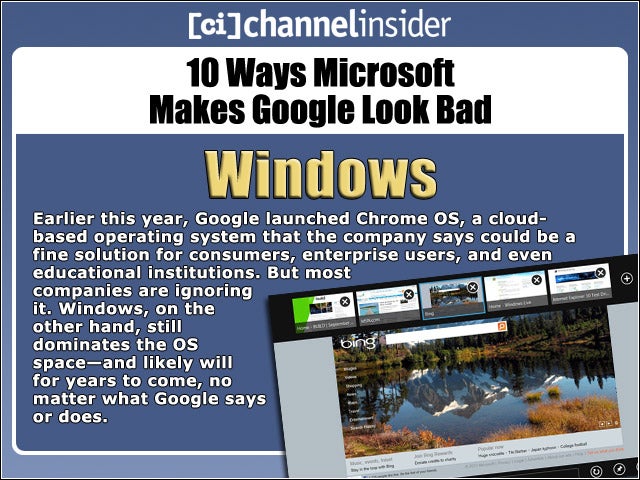 Windows
Windows
Earlier this year, Google launched Chrome OS, a cloud-based operating system that the company says could be a fine solution for consumers, enterprise users, and even educational institutions. But most companies are ignoring it. Windows, on the other hand, still dominates the OS space— and likely will for years to come, no matter what Google says or does.
 Office
Office
Office has been key to Microsoft’s success over the years. Google’s Docs, on the other hand, offer some competition. But it’s not likely Docs will take down Office. Companies around the globe rely upon Office and its functionality is simply too sophisticated for Google Docs to catch up anytime soon.
 Bing
Bing
Google is the de facto leader in the search market, but Microsoft has been able to gain about 11 percent of the search space in the U.S. under Google’s nose. Unlike Microsoft, which has been able to solidify its dominance in different markets, Google has allowed a major competitor to steal significant market share. Plus, if Yahoo is factored in, Bing is much closer to Google than the search giant might want to admit.
 A ‘Coasting’ Business
A ‘Coasting’ Business
Windows is an absolute necessity for the vast majority of the world, and Office is unlikely to ever be replaced by some folks. Google, on the other hand, must always innovate in order to keep customers interested in its key service, search. Worst of all, there’s nothing stopping users from switching to Bing or Yahoo. Google’s business is always at risk. It’s not a good thing.
 The Question of Power
The Question of Power
In the 1990s when Microsoft’s power was its height, there was little debating that the company was dominant. But thanks to measures put in place by Microsoft, Google doesn’t have that same level of dominance. The company is a leader, for sure, but whether it’s search or mobile operating systems, Microsoft, along with Apple and others, has ensured that Google’s power isn’t as great as some want to believe.
 No Title
No Title
Facebook InvestmentWhen it was learned that Microsoft invested in Facebook to own a small slice of the social network, some thought that the software giant was once again spending its money unwisely. But now that Facebook has grown into the world’s largest social network, and is expected to be valued at $100 billion next year when it should go public, it seems like a smart investment for Microsoft, and one that Google should have made.
 Android Lawsuits
Android Lawsuits
Android is under fire from several companies, including Oracle, Microsoft, and Apple, due to claims that it infringes on patents those companies hold. Google and its Android partners say that simply isn’t true. But Microsoft has been tallying major agreements with several Android vendors, forcing them to pay the software company for their use of Android. Believe it or not, Microsoft is profiting from Android. And as one might expect, Google doesn’t like that.
 The Tablet Play
The Tablet Play
Neither Microsoft nor Google have game-changing tablets. However, Microsoft has a strategy in place with Windows 8 that could change all that. Several vendors have signed on to develop a Windows 8-based tablet, and the operating system could be a winner. Meanwhile, Google’s Android platform is having trouble catching on in the tablet space. Look for Windows 8 to be a serious detriment to Google’s tablet plans.
 Home Entertainment
Home Entertainment
Google has its Google TV platform, a service that runs on some set-top boxes that lets users watch digital content, like Netflix, and on satellite television, control a DVR. But that platform hasn’t caught on. Microsoft, on the other hand, has the XBox 360, a device that’s selling better than any other console in the marketplace. It’s also arguably the best set-top box on the market.
 Key Acquisitions
Key Acquisitions
When it comes to making acquisitions, it’s hard to argue with Microsoft’s moves. Just this year, the company has acquired Skype and was one of many companies involved in the Nortel patent acquisitions. Google, on the other hand, bought Motorola Mobility for $12.5 billion—a price that some say, might be too high. Plus, the company was outbid by Microsoft and its colleagues to acquire the Nortel patents. So far this year, Microsoft is up one when it comes to acquisitions.

